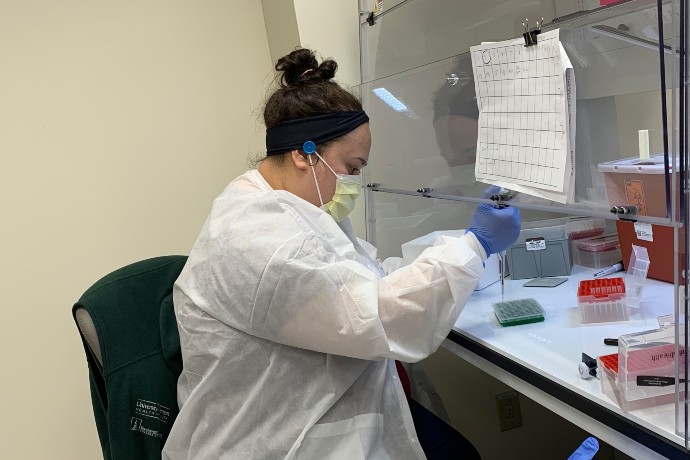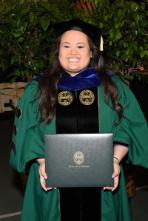TXWES alumna uses her expertise to improve COVID-19 testing

Diana Gerrard graduated from Texas Wesleyan in 2012 with a degree in biochemistry, and went on to earn her Ph.D. in cellular molecular and biomedical sciences from the University of Vermont last year. She now works in the University of Vermont Medical Center focusing on molecular pathology and genomic medicine. Her specific role there is to detect specific mutations within patient tumors, helping doctors determine what kinds of  therapies will be most successful in treating them.
therapies will be most successful in treating them.
Recently, she was called on to use her expertise to help with the increased demand for COVID-19 testing. This has been an overwhelming and rewarding time for Diana. Here’s what she had to say about her work and how TXWES impacted her career:
Tell about your specific role in the COVID testing process.
My COVID role started on March 16, 2020 when my leaders brought me on to help validate a test for COVID-19 as more positives began increasing in our region. At this time, we were beginning to face a nation-wide shortage in various components used for testing the SARS-COVID-2 genetic material (in the form of viral RNA). I was brought on because of my expertise in molecular biology and my experience with validations in our certified clinical laboratory. My experience from the research laboratory really helped me in the beginning of the process as we modified the protocol to use components more widely available in the scientific research community that were not a part of the original COVID-19 testing workflow. Since then, I have been serving the team away from my normal job-duties helping process the many COVID clinical samples through this workflow for detection.
What are the challenges of working on unknown virus such as this one?
As scientists, there are many challenges we face both on the personal and the professional level. Like many other essential workers, we have been dedicating 120% of ourselves for four months now. We balance taking care of ourselves inside and outside of work to be an active participant in the process, to stay well and to keep testing running. There are challenges in working with a new virus but we live in a time where our technology is so advanced so we have been able to learn more and more quickly. The amount of testing platforms available for COVID has increased quite a bit since we first started this process and there is truly a network of scientists, clinicians, epidemiologists, companies, etc. that are working together to keep things progressing.
Why do you love your job?
My job truly allows me to connect my love for people and molecular biology. While my expertise is within the very technical aspects of molecular biology, genomics and Next Generation Sequencing technologies, I love my job because of the feeling I get knowing that the work our team does has the potential to provide hope to individuals and their families facing cancer.
What’s your biggest take away from your time at Texas Wesleyan?
That the connections you make with people have the ability to last a lifetime. Texas Wesleyan has the smaller environment that allows for these relationships to be established. I am still well connected with many of my classmates from the biochemistry, chemistry and biology programs. We have remained extremely connected and get together on an annual basis. We have encouraged and supported each other through trials and successes as we have established ourselves in the professional world post-undergrad. Our professors through these programs have also remained supportive and we occationally touch base with them as well!
Who was your favorite TXWES professor?
My all-time favorite professor is Dr. Phillip Pelphrey, who also served as my advisor and research mentor through my undergraduate degree. He was the first person to introduce me to laboratory research and was always dedicated to me as a student. I mean, any professor that can get you interested in organic chemistry must REALLY be a good one. In all seriousness, Dr. Pelphrey always challenged me. Not only in the moments of the classroom and research but also to pursue more in my future. Without his encouragement and guidance I would not have taken the path that got me to where I am today. As I mentor undergraduate and graduate students, I seek to be the mentor that Dr. Pelphrey was/is to me.







